10 Herbal Teas For Hypothyroidism

Herbal teas have been used for centuries to help manage hypothyroidism, a condition where the thyroid gland doesn't produce enough hormones.
These teas work by stimulating the thyroid gland and improving hormone production. One example is Astragalus membranaceus, also known as Huang Qi, which is believed to stimulate the thyroid gland and boost hormone production. Another example is Zingiber officinale, or ginger, which has anti-inflammatory properties that can help reduce inflammation in the thyroid gland, allowing it to function properly. Panax ginseng is also often used to help regulate thyroid function and improve hormone production. These herbs can help alleviate symptoms of hypothyroidism such as fatigue, weight gain, and cold intolerance. Drinking herbal teas for hypothyroidism can bring many benefits to your life.
For one, they can help you manage symptoms and improve your overall quality of life. By regulating your thyroid hormones, you may experience increased energy levels, improved mood, and a reduced risk of developing other health problems associated with hypothyroidism. Additionally, herbal teas are a natural and gentle way to support thyroid health, making them a great alternative to prescription medications. They can also be used in conjunction with conventional treatments to enhance their effectiveness. It's worth noting that while herbal teas can be beneficial, they should not be used as a replacement for medical treatment. If you're experiencing symptoms of hypothyroidism, it's essential to consult with a healthcare professional for proper diagnosis and treatment.
However, incorporating herbal teas into your daily routine may be a helpful addition to your treatment plan, providing you with a natural and effective way to support your thyroid health.
- 1. Astragalus membranaceus
- 2. Zingiber officinale
- 3. Panax ginseng
- 4. Schisandra chinensis
- 5. Glycyrrhiza glabra
- 6. Curcuma longa
- 7. Withania somnifera
- 8. Angelica sinensis
- 9. Rehmannia glutinosa
- 10. Ginkgo biloba
1. Astragalus membranaceus
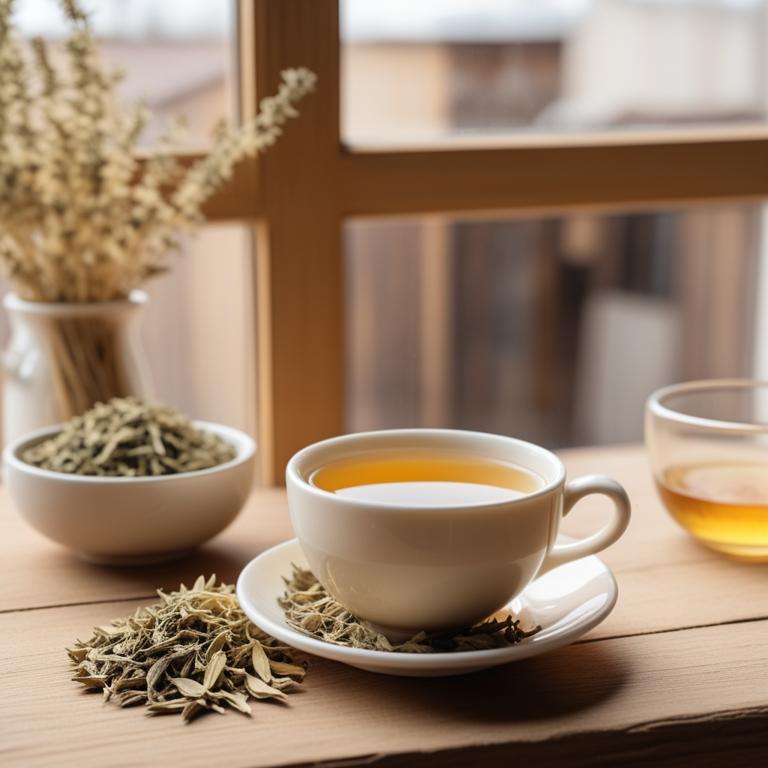
Astragalus membranaceus teas contains bioactive constituents like astragaloside IV, isoflavones, and polysaccharides.
These compounds have antioxidant, anti-inflammatory, and immunomodulatory properties that may help regulate the immune system and promote thyroid function. The isoflavones in Astragalus membranaceus teas can also act as thyroid hormone analogues, potentially supporting the production and utilization of thyroid hormones. Astragalus membranaceus teas has been shown to increase the levels of thyroid-stimulating hormone (TSH) and improve thyroid function in individuals with hypothyroidism.
Regular consumption of Astragalus membranaceus teas may help alleviate symptoms of hypothyroidism and improve overall thyroid health.
- Gather 2 tablespoons of dried Astragalus membranaceus root, 1 cup of water, and a tea infuser.
- Boil the water in a pot and pour it over the dried Astragalus membranaceus root in the tea infuser.
- Steep the mixture for 5-7 minutes, allowing the roots to infuse into the water.
- Strain the tea into a cup and discard the roots. Add honey or lemon to taste, if desired.
- Drink 1-2 cups of the Astragalus membranaceus tea per day, ideally 30 minutes before meals, to support thyroid health.
2. Zingiber officinale

Zingiber officinale teas contains gingerols and shogaols, which are its active constituents.
These compounds help to improve digestion and absorption of nutrients, which is essential for thyroid hormone production. Ginger has anti-inflammatory properties, which can reduce swelling and pain in the thyroid gland, making it easier for the gland to produce hormones. The warming effect of ginger can also help to stimulate the thyroid gland, increasing its ability to produce thyroid hormones.
Additionally, ginger has antioxidant properties that can help to reduce oxidative stress, which can damage the thyroid gland and disrupt hormone production.
- Gather 1 cup of fresh Ginger root (Zingiber officinale) and 1 cup of water.
- Wash the Ginger root under cold water, then slice it thinly.
- Combine sliced Ginger and water in a saucepan, then bring to a boil.
- Reduce heat and simmer for 10 minutes, or until the Ginger flavor is released.
- Strain the tea into a cup and drink immediately, or store it in the fridge for up to 24 hours.
Zingiber Officinale Tea on Amazon
FGO Organic Ginger Tea, 100 Count, Eco-Conscious Tea Bags, Caffeine Free, Packaging May Vary (Pack of 1)
Disclaimer: We earn a commission if you click this link and make a purchase at no additional cost to you.
3. Panax ginseng

Panax ginseng teas contains bioactive constituents like ginsenosides, which have been shown to stimulate the production of thyroid hormones.
These compounds, particularly Rg1 and Rb1, have been found to increase the activity of the thyroid gland and boost the production of thyroxine (T4) and triiodothyronine (T3). Ginsenosides also have antioxidant properties, which help protect the thyroid gland from damage caused by free radicals. Additionally, Panax ginseng teas have been found to regulate the immune system and reduce inflammation in the thyroid gland, which can contribute to hypothyroidism.
By stimulating thyroid hormone production and protecting the gland from damage, Panax ginseng teas may be a useful complement to conventional treatments for hypothyroidism.
- Gather 1 tablespoon of dried Panax ginseng root and 1 cup of boiling water.
- Steep the dried Panax ginseng root in the boiling water for 5-7 minutes.
- Strain the liquid into a cup and discard the root.
- Add honey to taste, if desired, and stir well.
- Drink the tea 1-2 times a day, ideally on an empty stomach.
4. Schisandra chinensis
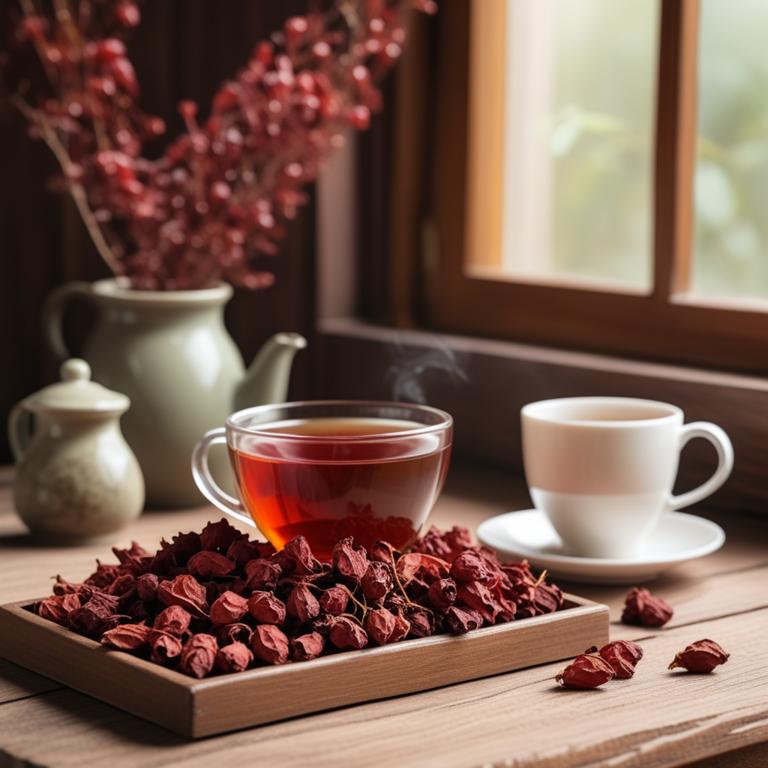
Schisandra chinensis teas contains a unique combination of active constituents, including schisandrins, schisantheric acid, and beta-sitosterol.
These compounds have antioxidant and anti-inflammatory properties, which are beneficial for people with hypothyroidism. Schisandrins, in particular, have been shown to improve liver function, which is essential for the production of thyroid hormones. Beta-sitosterol, a plant sterol, helps to balance cholesterol levels, which can be affected by hypothyroidism.
By reducing oxidative stress and inflammation, and supporting liver function, Schisandra chinensis teas may help to alleviate some symptoms of hypothyroidism.
- Gather 1 tablespoon of Schisandra chinensis dried berries and 1 cup of boiling water.
- Steep the Schisandra chinensis berries in boiling water for 5-7 minutes.
- Strain the mixture through a fine-mesh sieve into a cup to remove the berries.
- Add 1 tablespoon of honey (optional) to sweeten the tea if desired.
- Drink the tea 1-2 times a day, ideally 30 minutes before meals, to support thyroid health.
5. Glycyrrhiza glabra

Glycyrrhiza glabra teas contains bioactive constituents like glycyrrhizin and saponins, which have anti-inflammatory properties that help reduce thyroid inflammation.
This tea also contains flavonoids like licoricidin and licorisoflavone, which have antioxidant properties that protect the thyroid gland from damage. The anti-inflammatory properties of Glycyrrhiza glabra teas help reduce inflammation in the thyroid gland, which is often associated with hypothyroidism. Glycyrrhizin also helps regulate cortisol levels, which can become imbalanced in people with hypothyroidism.
By reducing inflammation and regulating cortisol levels, Glycyrrhiza glabra teas may help alleviate symptoms of hypothyroidism.
- Gather 1 cup of dried Glycyrrhiza glabra roots and 2 cups of water in a saucepan.
- Boil the water in the saucepan, then add the dried roots and let them steep for 5-7 minutes.
- Strain the mixture through a fine-mesh sieve into a cup, discarding the roots.
- Add 1 tablespoon of honey to the tea if desired, and mix well.
- Drink the tea 2-3 times a day, ideally before meals, to support thyroid health.
6. Curcuma longa

Curcuma longa teas contains bioactive constituents like curcumin, demethoxycurcumin, and bisdemethoxycurcumin, which have potent anti-inflammatory and antioxidant properties.
These compounds help reduce inflammation and oxidative stress in the body, which is associated with hypothyroidism. Curcumin, in particular, has been shown to improve thyroid function by increasing the production of thyroid hormones and reducing the levels of thyroid peroxidase antibodies. The antioxidants in Curcuma longa teas, such as curcumin and demethoxycurcumin, also help protect the thyroid gland from damage caused by free radicals.
By reducing inflammation and oxidative stress, Curcuma longa teas may help alleviate symptoms of hypothyroidism, such as fatigue and weight gain.
- Gather 1 tablespoon of dried Curcuma longa roots and 1 cup of boiling water.
- Steep the dried roots in the boiling water for 5-7 minutes.
- Strain the liquid through a fine-mesh sieve into a cup.
- Add 1 teaspoon of honey (optional) to the liquid and mix well.
- Drink the Curcuma longa tea immediately and repeat as directed by a healthcare professional.
7. Withania somnifera
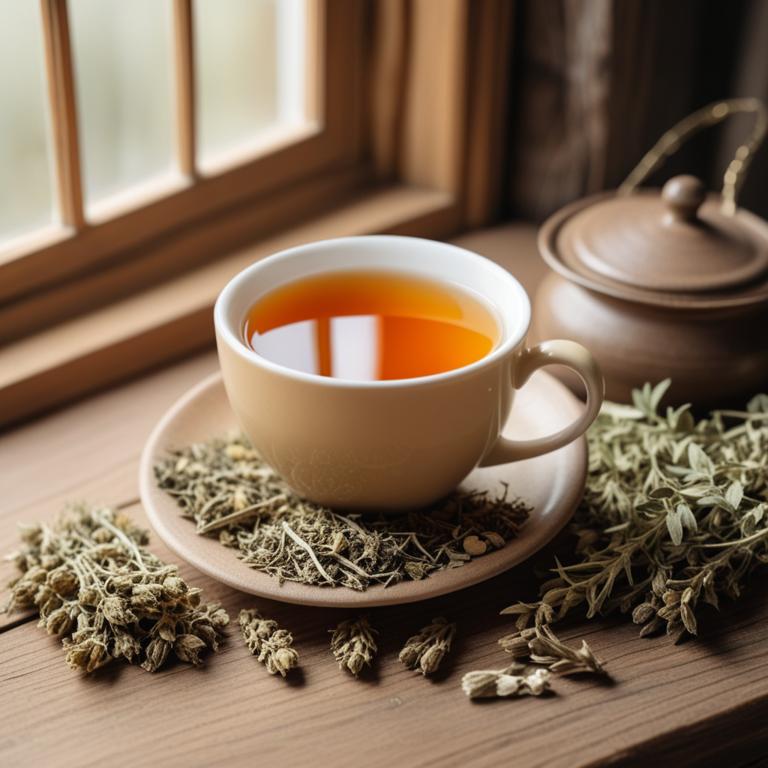
Withania somnifera teas contains bioactive constituents like withanolides, withaferins, and glycosides that have anti-inflammatory and antioxidant properties.
These compounds help to reduce oxidative stress and inflammation in the body, which are often associated with hypothyroidism. The withanolides in Withania somnifera teas have been shown to stimulate the production of thyroid hormones by increasing the expression of genes involved in thyroid function. Additionally, the antioxidant properties of these compounds help to protect the thyroid gland from damage caused by free radicals, which can contribute to hypothyroidism.
By reducing inflammation and oxidative stress, Withania somnifera teas may help to improve thyroid function and alleviate symptoms of hypothyroidism.
- Gather 1 cup of water, 1 tablespoon of dried Withania somnifera root, and a tea infuser or strainer.
- Boil the water in a pot and then reduce the heat to low.
- Add the dried Withania somnifera root to the tea infuser or strainer and put it in the pot.
- Steep for 5-7 minutes, then remove the tea infuser or strainer.
- Strain the tea into a cup and drink it warm, ideally 2-3 times a day.
8. Angelica sinensis
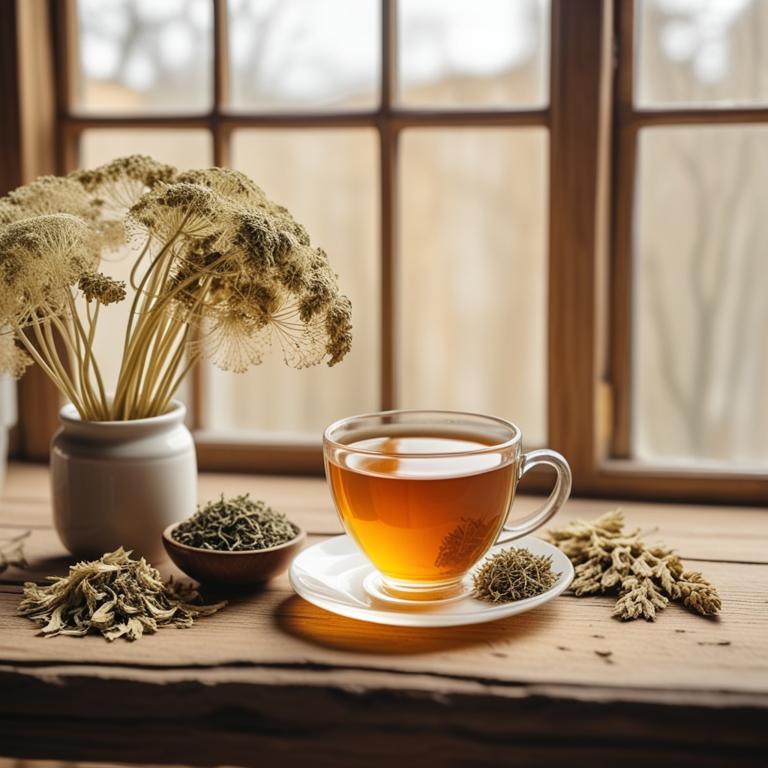
Angelica sinensis teas contains the bioactive constituents ferulic acid, feruloylquinic acid, and sinensetin, which have anti-inflammatory and antioxidant properties.
These compounds help to reduce inflammation in the thyroid gland, promoting normal thyroid function and reducing the symptoms of hypothyroidism. The tea also contains vitamins and minerals such as iron and zinc, which are essential for thyroid health and can help to support the production of thyroid hormones. The antioxidants in Angelica sinensis teas, including ferulic acid, can help to protect the thyroid gland from oxidative stress and damage caused by free radicals.
By reducing inflammation and promoting healthy thyroid function, Angelica sinensis teas can help to alleviate the symptoms of hypothyroidism, including fatigue, weight gain, and dry skin.
- Gather 1 cup of dried Angelica sinensis root and 4 cups of water.
- Boil the water in a pot and add the dried root.
- Reduce heat and simmer for 20-30 minutes.
- Strain the tea and discard the root. Add honey to taste.
- Drink 1/2 cup of the tea 2-3 times a day, ideally before meals.
9. Rehmannia glutinosa
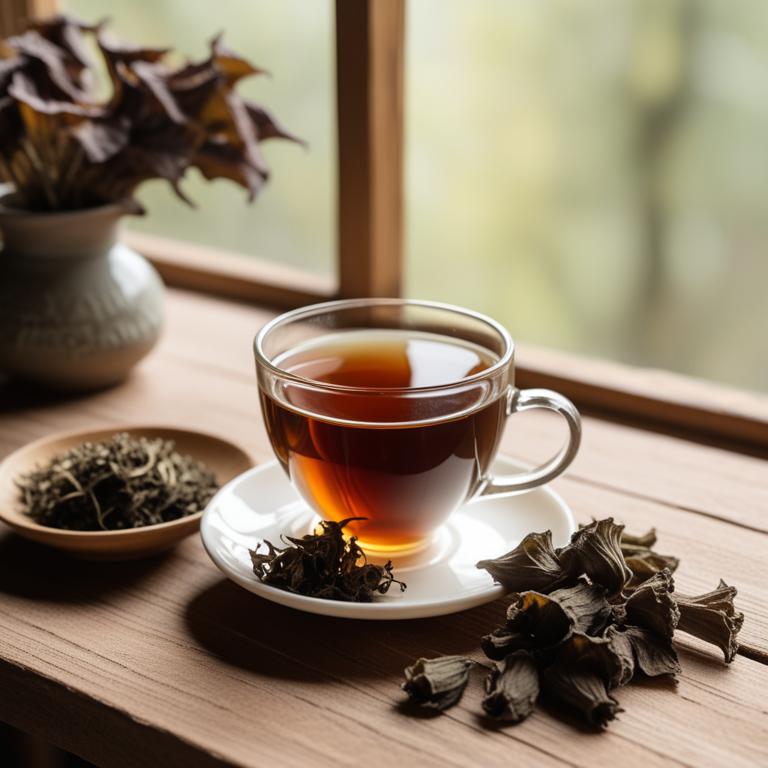
Rehmannia glutinosa teas contains iridoid glycosides, particularly catalpol, as well as polysaccharides, that have been shown to have a positive effect on hypothyroidism.
These compounds help to regulate thyroid function by increasing the production of thyroid hormones, specifically triiodothyronine (T3) and thyroxine (T4). The iridoid glycosides in Rehmannia glutinosa teas also have anti-inflammatory properties, which can help to reduce inflammation in the thyroid gland and promote a healthy thyroid environment. Additionally, the polysaccharides in the tea have been found to have an immunomodulatory effect, which can help to regulate the immune system's response to the thyroid gland and prevent autoimmune thyroiditis.
By regulating thyroid function and reducing inflammation and immune system dysregulation, Rehmannia glutinosa teas may help to alleviate symptoms of hypothyroidism such as fatigue, weight gain, and dry skin.
- Gather 20 grams of dried Rehmannia glutinosa root and 2 cups of water.
- Place the Rehmannia glutinosa root in a pot and add 2 cups of water.
- Bring the water to a boil, then reduce heat and simmer for 30 minutes.
- Strain the liquid and discard the Rehmannia glutinosa root.
- Drink 1 cup of the Rehmannia glutinosa tea, 2-3 times a day, to help with hypothyroidism symptoms.
10. Ginkgo biloba

Ginkgo biloba teas contains bioactive constituents like flavonoids, terpenoids, and bilobalide, which have anti-inflammatory and antioxidant properties.
These compounds help improve blood flow to the thyroid gland, enhancing its function and promoting the production of thyroid hormones. Ginkgo biloba's flavonoids, particularly quercetin and kaempferol, have been shown to inhibit the enzyme 5-deiodinase, which converts T4 to T3, a hormone that plays a crucial role in regulating metabolism. Additionally, ginkgo biloba's antioxidant properties help protect the thyroid gland from oxidative stress, which can contribute to hypothyroidism.
By improving thyroid function and reducing oxidative stress, ginkgo biloba teas may be beneficial for individuals with hypothyroidism.
- Gather 1 teaspoon of dried Ginkgo biloba leaves and 1 cup of boiling water.
- Steep the Ginkgo biloba leaves in the boiling water for 5-7 minutes.
- Strain the liquid into a cup and discard the leaves.
- Add 1 tablespoon of honey (optional) to the tea and stir well.
- Drink the tea once or twice a day as needed to help manage hypothyroidism symptoms.